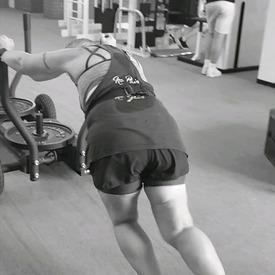Is it necessary to loose weight before starting weight training?

prpattani
Posts: 7 Member
My nutritionist has told me to start jogging ...1st loose weight and then do weight training..is it true
0
Replies
-
Absolutely not! It's never a bad time to start strength training. Did this nutritionist give you a reason? Do they have any fitness credentials?6
-
Based on everything I've read on these boards, everyone wishes they had started strength training earlier in their weight loss journey. I've never seen anyone say they wished they had waited.8
-
Not at all, from my learning I believe that anytime is a good time to start resistance training... I would question your nutritionist on this.3
-
No no no definitely not. Start lifting NOW! I incorporate weight training all the time (unless injured of course)... when losing, gaining, maintaining and pregnant (with modifications of course)2
-
Can't agree with kimny and Quiksylver more, for most the best time to start strength training was years ago, the second best time is as soon as possible. I started at 26 and wish I'd started at 16.2
-
No, I started weight training day 1 of 150 lb loss. It helped in so many ways. It also helps you look better in the end. I would say start weights, lose some weight, then start running when at a healthier weight.3
-
Weight training will help jogging, erm, running, much easier and enjoyable
Just the basics:
Arms (Curls and Extensions)
Shoulders (Shoulder press)
Back (Bent over rows)
Legs (SLDL or Roman lifts) --this one REALLY helps the running of hills.
Chest (Bench press)
Bodyweight equivalents would be:
Pushups
Pull ups
Australian pull ups
Back bridge
One leg squat
1 -
I weight train 3x per week and walk 3 miles 6-7x a week (I finally admitted to myself that I hate running). I've been keeping my calories between 1200 - 1300 daily (I'm 5'3"). I've been losing about 1lb a week and am down 18lbs. More importantly, I find this sustainable, am not starving or burning myself out. After all these many years, I've finally figured out it's not just about hitting a "goal" weight but giving myself mini-goals and a life-long lifestyle. So, I guess the long answer is - do both
 1
1 -
quiksylver296 wrote: »Based on everything I've read on these boards, everyone wishes they had started strength training earlier in their weight loss journey. I've never seen anyone say they wished they had waited.
I certainly wish I'd started right from the beginning rather than 6 months in1 -
Personally if I had to choose between jogging and weight training whilst I was at my heaviest I would choose weight training. I don't think my joints would have survived jogging at my heaviest but strength training helped my muscles support my joints, relieved my back pain and helped with my body composition. I went on to start jogging once I was about half-way to goal, still a bit of a struggle but easier than it would have been at 260lbs, I did walking, hiking and swimming for cardio initially.4
-
My experience:
- Focused on only losing weight by watching my calories
- Lost all the weight I wanted to
- Was skinny fat and very unhappy with how I looked despite being significantly smaller/lighter
- Very skinny arms, face was gaunt, I was wasting - and still had a belly
- Went to gym, started lifting
- Fast froward one year and Im a stone heavier and very happy with the shape Im in
- Now tell anyone who asks, ABSOLUTELY START LIFTING HEAVY THINGS as soon as you can/want to8 -
Adding in weight training is NOT bad. However, muscle gains add weight, so some people get frustrated that the scale does not drop as fast as they expect, and maybe your nutritionist is fearful of that and is saying add cardio, but not weights. Other wise I am not sure of why they are saying that, but discuss it with them. You are paying them to help you, well they will be much more helpful if you are both on the same page, plus you will probably buy in better too.0
-
Is it necessary to loose weight before starting weight training?
Sometimes. Morbidly obese people usually have form issues with strength training in my experience, partly because the weight gets in the way, and partly because of muscle imbalances from years of inactivity. The same is true for running - they often have form issues and a higher rate of injuries, according to studies. If you're not morbidly obese, sure, try lifting, but realize you may still have poor form if you've been inactive a while, or are new to lifting. The same with running. Follow a good running program, like C25K, and if you get pain, stop. Follow a proven strength program, like the ones in the pinned post, not random workouts from Pinterest, Youtube, etc. 3
3 -
As above I also wish I'd started earlier!1
-
Nutritionist are not Dieticians for one. And secondly, just like I wouldn't take nutritional advice from a trainer (unless they had an advanced nutrition certification, which most don't), I wouldn't take exercise advice from a nutritionist. Based on the advice you got, they obviously don't know what they are talking about. Keep the muscle you have! Start resistance training now!7
-
My nutritionist has told me to start jogging ...1st loose weight and then do weight training..is it true
Nope. I think part of the rationale is, to oversimplify:
You lose fat in a calorie deficit. You build muscle in a calorie surplus. (Again, oversimplification. It's possible, though considerably harder to build muscle in a small deficit, especially if you're significantly overweight. Google "newbie gains" for details. Still, optimal muscle growth occurs in a calorie surplus.)
With this in mind, it sounds as though strength training in a deficit is useless. It's not. See, assuming that you're ambulatory, you actually have a fair bit of muscle on your frame right now. It takes strength to haul your excess poundage around. And when you're losing weight, you generally lose a combination of fat and muscle. The reason is that when you're cutting back on your fuel, your body starts looking for less-essential functions it can shut down. Muscle "costs" a lot to maintain. And if you aren't using it, you risk losing it. To use an analogy:
I'm trying to save on electricity costs. So I'm going through the house, room by room, closing lights in empty rooms. Until I'm about flick a switch and an annoyed voice pipes up, "Hey! I'm reading here!" At which point, I apologize and leave the light alone.
When you strength train, your muscles are that annoyed voice. And your body decides to flick other switches instead.4 -
While I don't doubt that these points are valid, I was morbidly obese (and still am) and I'm sure glad nobody ever told me I shouldn't work out! I primarily do classes, so it's more cardio and HIIT and I can't speak much to strength training, but if someone morbidly obese wants to work out, I don't think I'd discourage them. For someone my size, in addition to your advice I'd say to start small and work your way up to more difficult things, know your limitations, modify moves as needed, and pay attention to notes about form.Cherimoose wrote: »Is it necessary to loose weight before starting weight training?
Sometimes. Morbidly obese people usually have form issues with strength training in my experience, partly because the weight gets in the way, and partly because of muscle imbalances from years of inactivity. The same is true for running - they often have form issues and a higher rate of injuries, according to studies. If you're not morbidly obese, sure, try lifting, but realize you may still have poor form if you've been inactive a while, or are new to lifting. The same with running. Follow a good running program, like C25K, and if you get pain, stop. Follow a proven strength program, like the ones in the pinned post, not random workouts from Pinterest, Youtube, etc. 3
3 -
Nice analogy, I like it : )estherdragonbat wrote: »I'm trying to save on electricity costs. So I'm going through the house, room by room, closing lights in empty rooms. Until I'm about flick a switch and an annoyed voice pipes up, "Hey! I'm reading here!" At which point, I apologize and leave the light alone.
When you strength train, your muscles are that annoyed voice. And your body decides to flick other switches instead.
I started lifting with a BMI of 40 and am 6 weeks in, and finding it perfectly possible to work with good form. I'm taking it slowly, watching lots of videos about form and asking the PTs for advice occasionally, and it's all good so far. Plus I feel absolutely EPIC : ) It really is worth starting now.1 -
My nutritionist has told me to start jogging
I'm guessing you're not morbidly obese if you've been advised to jog.
It's difficult to give a specific response to these type of general questions without knowing a bit more about the person. Should everyone lose weight before resistance/strength training? - answer NO. Should some people lose weight before? - perhaps. Should you? - perhaps. It all depends on your individual circumstances.
In general, regular and consistent resistance/strength training trumps cardio for weight loss on the majority of ocassions. BUT, the number one factor in weight loss is getting yourself into a calorie deficit.
If your priority is fat loss, start there. If your priority is to gain strength then start strength training. Even if you do nothing with your diet, in the majority of cases regualr and consistent strength training will lead to fat loss. Note I said fat loss and not weight loss. It's possible to lose fat whilst gaining muscle at the same time and keep your weight the same. Don't take my word for it though. Have a look here:
Also worth bearing in mind that not all strength training requires external equipment. Body weight training is a very effective way to build strength.
Hope that helps.
1 -
Weight lifting is the best thing I did for my health in a long while. First time I saw my body change. With running I was just a little smaller but still not happy with my shape. Now I have abs, which I never thought I'd have. Always had a flat tummy as I'm naturally smaller, but never had definition.0
-
It may be that your nutritionist has a good reason for this advice, and I can guess at some, but if you want to stength train, you should do it! I stared with just cardio this time and just added strength training the last month. I do weights three times a week and cardio 2 to 3, plus lots of stretching. Last time I started with both stength training and cardio. There was no downside for me then. This time I had to start with cardio because I had some injuries that prevented me from lifting. Stength training helps maintain muscle mass, but it can also increase your appetite. I combat that with protein and lots of veggies.0
-
It may be that your nutritionist has a good reason for this advice, and I can guess at some, but if you want to stength train, you should do it! I stared with just cardio this time and just added strength training the last month. I do weights three times a week and cardio 2 to 3, plus lots of stretching. Last time I started with both stength training and cardio. There was no downside for me then. This time I had to start with cardio because I had some injuries that prevented me from lifting. Stength training helps maintain muscle mass, but it can also increase your appetite. I combat that with protein and lots of veggies.
I think that's a personal thing, I get no increase in appetite from strength training but if I increase cardio it's through the roof.
2 -
tinkerbellang83 wrote: »It may be that your nutritionist has a good reason for this advice, and I can guess at some, but if you want to stength train, you should do it! I stared with just cardio this time and just added strength training the last month. I do weights three times a week and cardio 2 to 3, plus lots of stretching. Last time I started with both stength training and cardio. There was no downside for me then. This time I had to start with cardio because I had some injuries that prevented me from lifting. Stength training helps maintain muscle mass, but it can also increase your appetite. I combat that with protein and lots of veggies.
I think that's a personal thing, I get no increase in appetite from strength training but if I increase cardio it's through the roof.
Same here. I get no appetite increase from strength training.0 -
Weight training will help jogging, erm, running, much easier and enjoyable
Just the basics:
Arms (Curls and Extensions)
Shoulders (Shoulder press)
Back (Bent over rows)
Legs (SLDL or Roman lifts) --this one REALLY helps the running of hills.
Chest (Bench press)
Bodyweight equivalents would be:
Pushups
Pull ups
Australian pull ups
Back bridge
One leg squat
Depending on the program, curls and extensions may not be needed and should be bottom of this list. more importantly, than listed exercise, is finding a tried tested and true program that is intended for your level and has progression built in.
Starting to lift now will help you retain the muscle you already have and if overweight and new to lifting may actually build some muscle as you lose fat. This will have you at a lower BF% at your goal weight than if you waited to start.1
This discussion has been closed.
Categories
- All Categories
- 1.4M Health, Wellness and Goals
- 398.2K Introduce Yourself
- 44.7K Getting Started
- 261K Health and Weight Loss
- 176.4K Food and Nutrition
- 47.7K Recipes
- 233K Fitness and Exercise
- 462 Sleep, Mindfulness and Overall Wellness
- 6.5K Goal: Maintaining Weight
- 8.7K Goal: Gaining Weight and Body Building
- 153.5K Motivation and Support
- 8.4K Challenges
- 1.4K Debate Club
- 96.5K Chit-Chat
- 2.6K Fun and Games
- 4.8K MyFitnessPal Information
- 12 News and Announcements
- 21 MyFitnessPal Academy
- 1.6K Feature Suggestions and Ideas
- 3.2K MyFitnessPal Tech Support Questions




















